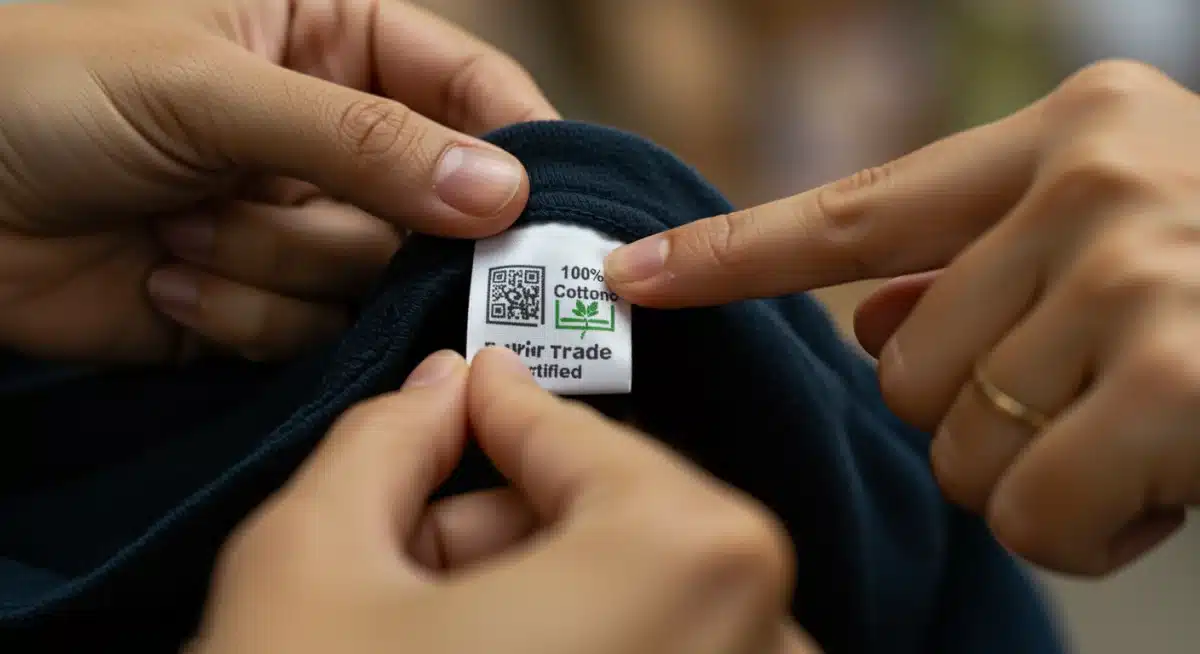2026 Ethical Fashion Guide for American Women: 5 Leading Brands

Advertisements
The landscape of sustainable style is rapidly evolving, and the 2026 Guide to Ethical Fashion Brands for American Women: 5 Companies Leading the Way (Recent Updates) is here to highlight the pioneers. As consumers increasingly demand transparency and responsibility, which brands are truly making a difference?
The Rising Tide of Conscious Consumerism in 2026
As of late 2025, American consumers are demonstrating an unprecedented commitment to ethical consumption. This surge is particularly evident in the fashion sector, where awareness of environmental impact and labor practices has reached a critical mass. The demand for clothing that aligns with personal values is no longer a niche market but a significant driver of purchasing decisions, especially among women aged 25-55.
Recent market analyses indicate a substantial shift, with a 15% increase in searches for ‘ethical fashion brands’ and ‘sustainable clothing’ over the last quarter alone. This trend underscores a growing impatience with greenwashing and a preference for brands offering genuine transparency and verifiable ethical credentials. The conversation has moved beyond mere awareness to active demand for change, pushing companies to adapt or risk obsolescence in a rapidly evolving market.
Defining Ethical Fashion Principles Today
In 2026, ethical fashion encompasses a broad spectrum of practices, extending far beyond just organic materials. It includes fair labor wages, safe working conditions, minimal environmental impact, animal welfare, and transparency throughout the supply chain. Brands that truly lead in this space are integrating these principles at every stage of production, from raw material sourcing to end-of-life garment solutions.
- Fair Labor Practices: Ensuring living wages and safe environments for all workers.
- Environmental Stewardship: Reducing water usage, minimizing waste, and avoiding harmful chemicals.
- Material Innovation: Prioritizing recycled, organic, and biodegradable fabrics.
- Supply Chain Transparency: Providing clear information on origin and production processes.
Brand Spotlight: Patagonia’s Enduring Commitment
Patagonia continues to set the benchmark for ethical practices in 2026, building on decades of environmental activism and responsible manufacturing. Their ‘Worn Wear’ program, which encourages repair and reuse, remains a cornerstone of their circular economy efforts. This initiative not only extends the life of their garments but also educates consumers on the value of durable, repairable clothing, directly combating fast fashion’s disposable culture.
Recent updates from Patagonia include expanded investments in regenerative agriculture for their cotton sourcing, aiming to improve soil health and biodiversity. They are also actively campaigning for stronger labor protections across the global textile industry, leveraging their influence to advocate for systemic change. Their commitment to donating 1% of sales to environmental causes, through their 1% for the Planet initiative, further solidifies their position as a true leader.
Innovations in Sustainable Materials
Patagonia’s material innovation continues to impress. They have significantly increased their use of recycled polyester, diverting millions of plastic bottles from landfills. Furthermore, their research into bio-based alternatives for synthetic fibers shows promising advancements, potentially reducing reliance on petroleum-derived materials. This forward-thinking approach ensures their products are not only high-performing but also environmentally sound.
- Recycled Polyester: Widely used in their fleece and outerwear, reducing plastic waste.
- Organic Cotton: Sourced from farms committed to regenerative practices.
- Hemp and Tencel Lyocell: Incorporated for their low environmental footprint and durability.
- Fair Trade Certified™: A significant portion of their line is made in Fair Trade Certified™ factories.
Eileen Fisher: Timeless Style, Ethical Core
Eileen Fisher has long been synonymous with minimalist design and a deep commitment to sustainability. In 2026, the brand continues its leadership by focusing on circularity and a holistic approach to ethical fashion. Their ‘Renew’ program, which takes back worn Eileen Fisher garments for resale or recycling, has seen a significant expansion, reinforcing their dedication to keeping clothing out of landfills. This program is a vital part of their strategy to close the loop on textile waste.
The brand’s supply chain transparency efforts have also intensified, with detailed reports available on their website outlining their material sourcing, manufacturing partners, and social impact initiatives. They are actively working with their suppliers to implement stricter environmental standards and improve working conditions, ensuring that their ethical values are upheld at every level of production. Their focus on high-quality, durable pieces encourages longevity and reduces the need for frequent replacements.

Pioneering Textile Recycling Initiatives
Eileen Fisher is at the forefront of textile recycling innovation. Their ‘Waste No More’ initiative transforms damaged or unsellable garments into new designs and art pieces, showcasing creative solutions to textile waste. This approach not only diverts waste but also highlights the intrinsic value of materials, promoting a mindset of resourcefulness and creativity within the fashion industry. The brand’s investment in mechanical and chemical recycling technologies further demonstrates its commitment to a future where textile waste is virtually eliminated.
Reformation: Sustainable Chic for the Modern Woman
Reformation has carved out a significant niche by proving that ethical fashion can be both stylish and accessible. For 2026, the brand continues to refine its sustainable practices while expanding its reach within the American market. Known for its trendy dresses and denim, Reformation provides detailed ‘RefScale’ data for each product, illustrating its environmental impact savings in terms of water, waste, and carbon dioxide compared to conventional garments. This level of transparency resonates deeply with eco-conscious consumers.
Recent developments include further investment in renewable energy for their manufacturing facilities and a push towards 100% circularity in their core product lines. They are also exploring innovative packaging solutions to minimize plastic use and reduce their overall carbon footprint. Reformation’s commitment to fair wages and safe working conditions for their employees and supply chain partners remains a top priority, bolstered by regular audits and community engagement programs.
Expanding Ethical Sourcing and Production
Reformation’s efforts in ethical sourcing are expanding beyond organic and recycled materials. They are increasingly utilizing Tencel Lyocell, a fiber made from sustainably sourced wood pulp, known for its soft feel and low environmental impact. Their factories in Los Angeles operate under strict environmental and labor standards, ensuring that their production practices align with their stated values. The brand’s rapid growth demonstrates that sustainable practices can indeed drive commercial success in the competitive fashion industry.
- RefScale Transparency: Quantifies environmental savings for each garment.
- Renewable Energy Use: Powering operations with cleaner energy sources.
- Circular Design: Aiming for products that can be recycled or biodegraded.
- Local Production: A significant portion of their clothing is made in their own sustainable factory in LA.
Tentree: Planting a Future, One Garment at a Time
Tentree distinguishes itself with a unique proposition: for every item purchased, ten trees are planted. This direct, tangible environmental impact has resonated strongly with consumers in 2026, positioning them as a leader in purpose-driven fashion. Beyond tree planting, Tentree is deeply committed to using only sustainable materials and ensuring ethical production practices across its supply chain. Their casual wear, ranging from hoodies to activewear, is designed for comfort and durability.
Recent updates reveal a significant expansion of their tree-planting projects, reaching new reforestation sites globally and creating local employment opportunities. They are also enhancing their traceability systems, allowing customers to track the impact of their purchases, including where their trees are planted. Tentree’s commitment extends to using eco-friendly dyes and finishes, further minimizing their environmental footprint and ensuring their products are safe for both people and the planet.
Community Impact and Reforestation Efforts
The core of Tentree’s mission lies in its reforestation efforts, which not only combat climate change but also support local communities. By planting millions of trees, they help restore ecosystems, improve air quality, and provide sustainable livelihoods for those involved in planting and caring for the trees. This integrated approach to sustainability, combining environmental restoration with ethical fashion, offers a powerful model for other brands to emulate.
Amour Vert: French Chic Meets Californian Sustainability
Amour Vert, meaning ‘Green Love’ in French, continues to charm American women with its blend of Parisian-inspired elegance and Californian eco-consciousness. In 2026, the brand remains dedicated to its ‘Buy a Tee, Plant a Tree’ program, having planted hundreds of thousands of trees in North America. Their focus on locally sourced materials and manufacturing in the USA significantly reduces their carbon footprint, appealing to consumers seeking both style and responsible production.
Recent developments include an increased emphasis on zero-waste production techniques, minimizing fabric scraps and repurposing remnants into new designs. They are also expanding their collection of pieces made from innovative, low-impact fabrics such as Cupro, certified organic cotton, and Tencel Modal. Amour Vert’s commitment to creating versatile, high-quality pieces that stand the test of time encourages a slower, more thoughtful approach to fashion consumption, directly countering the fast fashion cycle.
Sustainable Fabric Innovations and Local Production
Amour Vert’s dedication to sustainable fabrics is evident in its carefully curated material selection. They prioritize fabrics that are not only environmentally friendly but also luxurious and comfortable to wear. Their commitment to manufacturing in the United States supports local economies and allows for stricter oversight of labor practices and environmental standards, ensuring transparency and ethical production from start to finish. This localized approach is a key differentiator in the global ethical fashion market.
| Key Point | Brief Description |
|---|---|
| Patagonia’s Circularity | Leading in repair, reuse, and regenerative agriculture, setting industry standards for environmental stewardship. |
| Eileen Fisher’s Renew Program | Expanding garment take-back and recycling initiatives, pioneering textile waste solutions for a closed-loop system. |
| Reformation’s Transparency | Offers detailed ‘RefScale’ impact data for each product, emphasizing stylish sustainability and ethical production. |
| Tentree’s Reforestation | Plants ten trees for every item sold, focusing on sustainable materials and global reforestation projects. |
Frequently Asked Questions About Ethical Fashion in 2026
In 2026, an ethical fashion brand prioritizes fair labor, environmental sustainability, and supply chain transparency. This includes using eco-friendly materials, reducing waste, ensuring safe working conditions, and actively minimizing their carbon footprint throughout production, from design to delivery.
American women are increasingly conscious of fashion’s social and environmental impact. They seek brands aligning with their values, demanding transparency and responsible production. This trend reflects a broader cultural shift towards conscious consumerism and a desire for products that do good, not just look good.
Consumers can look for third-party certifications like Fair Trade, GOTS (Global Organic Textile Standard), or B Corp. Additionally, reputable brands often provide detailed sustainability reports, supply chain maps, and impact data on their websites, allowing for informed purchasing decisions and verification of claims.
Ethical fashion often involves higher production costs due to fair wages, sustainable materials, and responsible manufacturing. While initial prices might be higher, these garments are typically more durable and timeless, offering better long-term value and reducing the need for frequent replacements, thus saving money over time.
Circularity is crucial, focusing on designing waste out of the system. This involves using recycled materials, designing for durability, and implementing take-back programs for repair or recycling. The goal is to keep resources in use for as long as possible, minimizing environmental impact and creating a closed-loop system.
What Happens Next: The Future of Ethical Fashion
The trajectory for ethical fashion in 2026 and beyond points towards even greater integration of technology for transparency and traceability. Expect to see blockchain technology play a more significant role in verifying supply chains and ensuring ethical compliance. Furthermore, legislative pressures are mounting for stricter regulations on environmental impact and labor practices within the textile industry, which could level the playing field for genuinely sustainable brands. Consumers will continue to be the driving force, with their purchasing power shaping a more responsible and equitable fashion future. The spotlight will remain on brands that not only meet but exceed current ethical standards.





